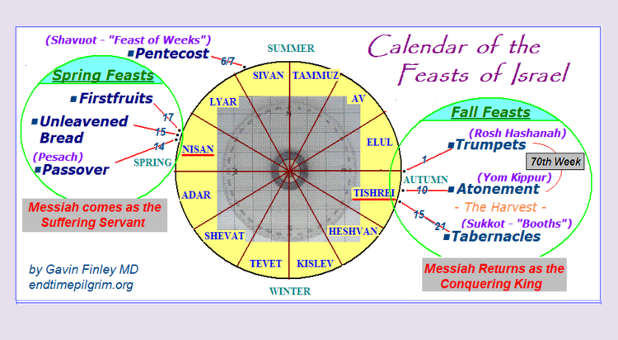Should Christians Follow the Hebraic Calendar?
Yom Teruach, Yom Kippur, Sukkot
After the spring festivals, there is a long season of growing and harvesting before the autumn festivals that celebrate the final harvest. Jesus compared Himself to a master who entrusted talents to his servants, went on a journey, then “after a long time” (Matt. 25:19) returned to hold his servants accountable. There is “a long time” between the spring and the autumn feasts.
Three feasts take place in the fall: the Feast of Trumpets (Yom Teruach) on the 1st day of the seventh month of Tishrei, the Day of Atonement (Yom Kippur) on the 10th day of Tishrei, and the Feast of Tabernacles (Sukkot) from the 15th to the 22nd days of Tishrei. Jewish tradition calls the first day of Tishrei Rosh Hashana (“head of the year”), and celebrate this day as the beginning of the civic year, but the beginning of God’s year is in the spring, on the first day of Nisan.
The fall festivals are important for us because they have yet to come into their full prophetic significance. If Jesus used God’s calendar for the spring festivals, we can well assume that He will do the same with the fall feasts. In Paul’s letters to both Corinth and Thessalonica, he refers to a trumpet call that will resound at the second coming of Jesus. The Day of Atonement is a day of introspection and judgment. Tabernacles looks forward to the time when we will “tabernacle” together with God.
But there is more! Jesus calls Himself “the Alpha and the Omega, the First and the Last, the Beginning and the End” (Rev. 22:13). He often begins and ends at the same place. He left from the Mount of Olives and He is to return to the Mount of Olives. There seems to be biblical evidence that Jesus will not only return during the fall season, but that He was born during the Feast of Tabernacles.
Zechariah “belonged to the priestly division of Abijah” (Luke 1:15), serving in the Temple in the eighth rotation, thus the later part of the fourth biblical month (See 1 Chron. 24:10). Mary’s pregnancy occurred six months later when “God sent the angel Gabriel to Nazareth (v. 26), thus the later part of the 10th biblical month. This would mean that Jesus was born nine months later, in the later part of the 19th month following Gabriel’s announcement to Zechariah, thus in the later part of the seventh biblical month at the time of the Feast of Tabernacles. No wonder John said that “the Word became flesh and tabernacled among us” (John 1:14, Amplified). It’s fascinating, don’t you think?
We’ve been robbed of our heritage and our connection to our roots, which is why Grant Berry burns the trail to help reconnect us spiritually with his ministry focus. God has a calendar; we have a calendar. He will never get on ours, but it’s best we get on His!
















































